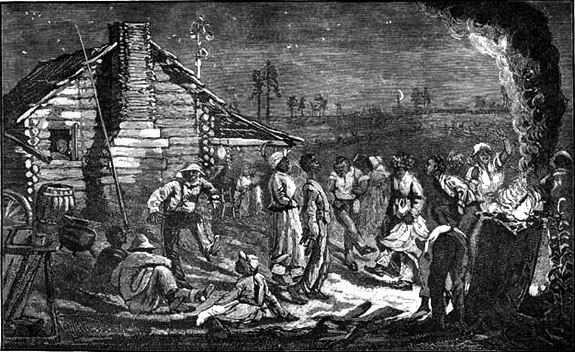December 3
The December 3rd issue of Publisher’s Weekly in 1881 recorded the fact that a new book, entitled Uncle Remus, His Songs and His Sayings—The Folklore of the Old Plantation was ready for publication. Written by a Georgia printer-journalist named Joel Chandler Harris, Uncle Remus struck such a responsive chord that it quickly became a best seller, establishing its author as one of the most successful interpreters of Southern Negro folklore.
Harris was born in Eatonton, Georgia in 1848 and received an early love of books from his mother. Since she had been abandoned by her husband prior to the birth of her son, she encountered considerable difficulty in supporting the child. It was necessary for Joel to seek his first employment in his fourteenth year.
He answered an advertisement for a boy to learn printing in the office of a newly established weekly newspaper edited by Joseph Addison Turner, a wealthy plantation owner who had yearnings for a literary and journalistic career. This paper, the Countryman, was produced on Turner’s large estate.
Harris was most fortunate in having the run of the plantation, including its library, and even more important to his subsequent career, he had the opportunity to observe at first hand its living conditions, particularly of the Negro slaves. He began to learn their legends and the sounds of their speech, acquiring an ear for dialect that was later to make his stories most authentic. In November, 1864, however, this instruction ended when the life of the plantation was completely disrupted by Sherman’s march to the sea, forcing Harris to search for employment elsewhere.
Harris next took a job as a compositor with the Macon Telegraph and at the same time commenced freelance writing. On the strength of this activity he was offered a job as assistant editor of the Crescent Monthly in New Orleans. Here he remained but a short time, returning to Forsyth, Georgia to edit the Monroe Advertiser. This was an unhappy experience, of which he later wrote: “I set all the type, pulled the press, kept the books, swept the floor, and wrapped the papers for mailing; my mechanical, accounting and menial duties being concealed from the vulgar hilarity of the world outside of Forsyth by the honorable and impressive title of ‘Editor.’ ”
In 1870 Harris finally left the back shop to become an editorial writer for the Savannah Morning News. A friend later described his entry as a formal journalist: “I shall never forget the first night Col. Estill brought Joe Harris up into the composing room and sanctum and introduced him to us all. We thought at the time that he was the greenest, gawkiest-looking specimen of humanity our eyes ever rested upon. He was small of stature, freckle-faced, and looked like a typical backwoods country youth.”
Even though, as a best-selling writer he acquired an outward polish, Harris always remained the country boy, never at home among strangers. While he accepted an invitation to visit the White House as the guest of Theodore Roosevelt, he was always much more content with Brer Rabbit in his native Georgia, which he never left, except for short trips, during his lifetime. He died in 1908.
